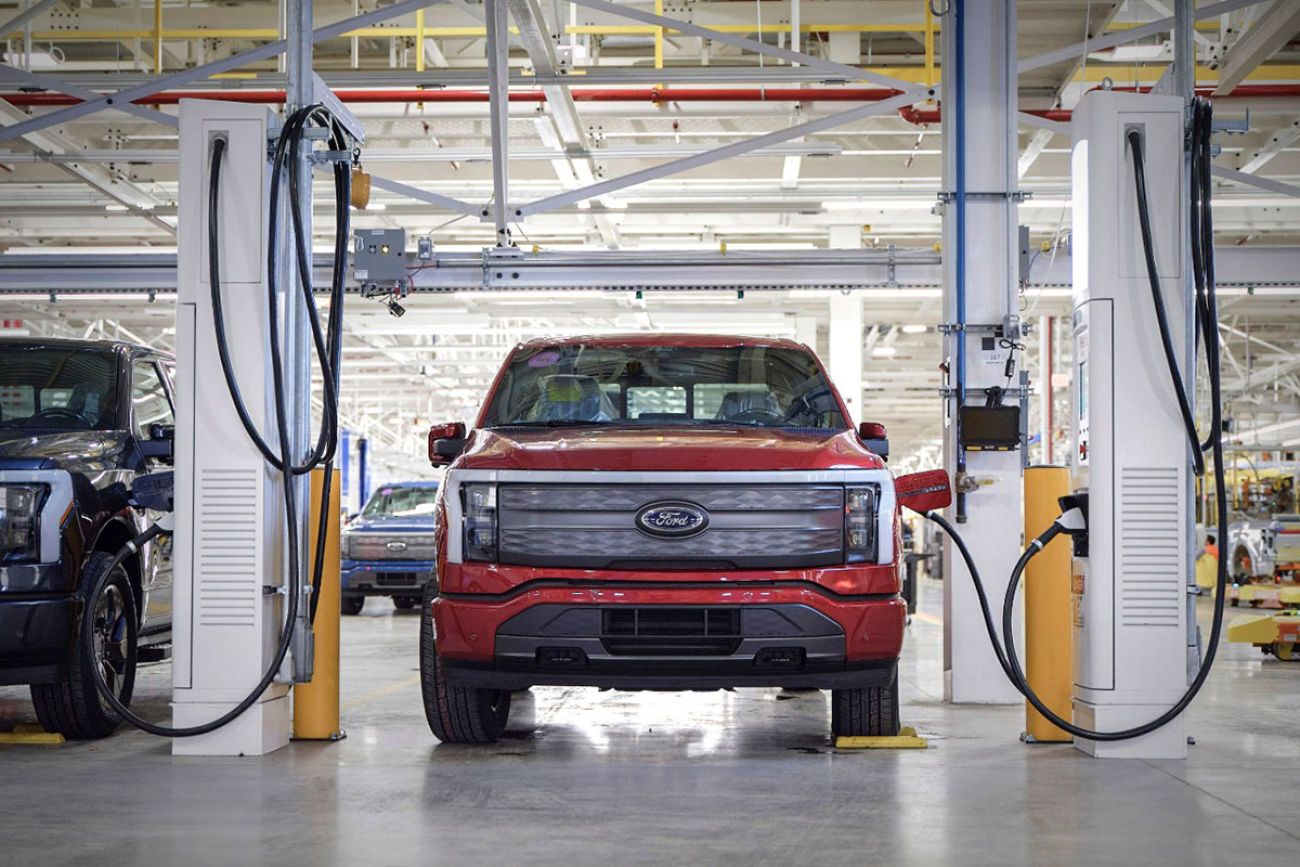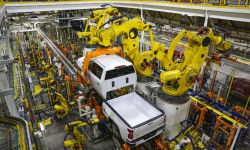Poll: EV politics could cost Michigan its auto industry

Michigan’s investment in electrical vehicle manufacturing tops $1 billion. Is it worth it?
Almost half of registered voters in the state would say no.
So says the Detroit Regional Chamber this week, as the business group released its latest poll produced with The Glengariff Group Inc. The partnership produces regular insight into how voters across the state view issues facing Michigan.
The new iteration, like earlier editions, surveyed 600 registered voters. Its margin of error was 4 percentage points.
This post originally appeared in Bridge Michigan's weekly Business Watch newsletter. Click here to subscribe.
The political divide over EVs can be heard in the presidential campaign rhetoric between Democratic Vice President Kamala Harris and former Republican President Donald Trump.
Related:
- 2024 Michigan EV road trip
- Michigan has spent $1B on EV, battery plants. So far, they’ve created 200 jobs
- Michigan lawmakers eye changes to corporate incentives after Bridge report
- Michigan boosts funding to attract new EV-related factories
But when it comes to Michigan — and the potential impact views on EVs could have on the state’s economic future — the split is now quantified by the chamber poll. And officials said some of it points to a willingness to “surrender” the auto industry to other states or countries.
It turns out that just a narrow majority of state voters — 50.3% — say Michigan should compete to be a leader in EV manufacturing.
In contrast, 45% say they are opposed. Who are they? Independents and Republicans, both those leaning slightly red and full-on scarlet.
About 7% of autos sold in the U.S. in 2023 were EVs, compared to about 1 in 5 sold globally. While the pace is slower than expected, experts say drivers are slowly swinging to EVs and increasingly interested in plug-in hybrids. GM forecasts EV profitability in the fourth quarter.
The survey shows the extreme politicization surrounding EVs, which the chamber says is cause for more than concern. The situation is an existential threat for Michigan’s signature industry, the southeast Michigan-based chamber leaders said.
The choice facing the state over EVs is not what kinds of cars voters want Michigan to be making, the chamber said. It’s whether Michigan will be making autos at all.
“Michigan’s 12 assembly plants will either produce the products that the market demands into the future, or they will not exist, and automotive jobs will disappear with them,” according to the take by MichAuto, the statewide automotive arm of the chamber.
“This is extremely concerning,” the statement continued. “Our state is a global epicenter for automotive manufacturing and innovation. To maintain our leadership role as the industry transitions, it will be critical that we lead in the development of new battery technology and that our supplier and assembly plants transition as well.”
Some other findings of the poll that have the chamber’s attention:
- Just over three-fourths of Michigan voters — 76% — support developing an advanced technology economy in Michigan. Among those who don’t, most are strong Republicans. Younger voters — 38% under the age of 40 — also are least supportive of an advanced tech economy.
- Michigan voters largely support economic development incentives when presented as a move that would add jobs, but support falls to about 57% when the jobs would come from a Chinese company. The opposition comes from Republican and rural voters, as has been seen with the conflict near Big Rapids over Gotion Inc.
- Jobs in the auto industry increasingly will involve electrification and digitalization. Yet about 54% of voters who didn’t go to college are willing to pursue more education.
Meanwhile, more than 60% of voters surveyed could not say whether they believe the state’s economy will grow as fast as leading peer regions — places like Austin, Texas — over the next 10 years. A 2023 report from Business Leaders for Michigan said Michigan is a “below-average state,” based on its 2022 benchmarking (which hasn’t been updated).
And just 16% of voters surveyed said Michigan is very prepared to compete in the global economy during that time frame.
The conclusion from Richard Czuba, president of the polling company, also spoke to the extent of the risks facing the auto industry.
“It’s not just that voters aren’t willing to get the skills to fill future automotive jobs — it appears many Michigan voters, because of their politics, don’t even want those future automotive jobs in Michigan,” Czuba said in a statement.
What do you think? Is Michigan’s automotive industry on the line due to political divide? What does this say for the future of a “purple” state that is closely split between Democrats and Republicans, but geographically imbalanced due to the large swaths of rural areas that vote red? And what does all of that mean for business?
Let me know. My email address is [email protected].
Business Watch
Covering the intersection of business and policy, and informing Michigan employers and workers on the long road back from coronavirus.
- About Business Watch
- Subscribe
- Share tips and questions with Bridge Business Editor Paula Gardner
Thanks to our Business Watch sponsors.
Support Bridge's nonprofit civic journalism. Donate today.
See what new members are saying about why they donated to Bridge Michigan:
- “In order for this information to be accurate and unbiased it must be underwritten by its readers, not by special interests.” - Larry S.
- “Not many other media sources report on the topics Bridge does.” - Susan B.
- “Your journalism is outstanding and rare these days.” - Mark S.
If you want to ensure the future of nonpartisan, nonprofit Michigan journalism, please become a member today. You, too, will be asked why you donated and maybe we'll feature your quote next time!




